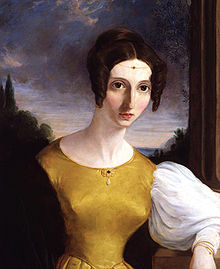Day of Birth: October 1807
Place of Birth: Walworth, south London
Day of Death: 3 November 1858
Place of Death: Avignon, France
Taylor
was an English philosopher and early advocate for women's rights, who is often
overshadowed by her husband, the philosopher John Stuart Mill.
Harriet Hardy was the daughter of a surgeon.
Educated at home, she enjoyed writing poetry. In 1826, she married John Taylor,
a prosperous merchant and together they had three children. The Taylors became
active in the Unitarian Church and in 1830 a Unitarian minister introduced
Harriet to the philosopher John Stuart Mill. Harriet and John met for the first
time in 1830. Their meeting was arranged by the leader of Harriet's Unitarian
congregation, the Reverend W. J. Fox. There is no way to know whether Fox
anticipated that passionate feelings would spring up between John and Harriet,
but whatever his intention, the two young people did very quickly fall in love.
Their conduct during the long period in which Harriet was married to John
Taylor would be scandalous by contemporary standards, let alone Victorian ones.
Their affair was to last for more than 20 years, and was generally tolerated by
Harriet's husband. From 1833, the couple largely lived apart, enabling Harriet
to see Mill more easily. Their behavior scandalized society and as a couple
they were socially isolated. But they inspired each other intellectually and
often worked together.
Mills'
'The Principles of Political Economy' (1848) has a chapter attributed to
Harriet called 'On the Probable Future of the Labouring Classes' in which she
argues for the importance of education for all in the future of the nation,
both economically and socially. Her essay, 'The Enfranchisement of Women'
(1851), considered one of her most important works, was published under Mills's
name. The essay strongly advocated that women be given access to the same jobs
as men, and that they should not have to live in 'separate spheres' - views
more radical than those of Mills himself. “The Enfranchisement of
Women,” published in The Westminster Review in 1851, is the best candidate for a
significant philosophical work authored primarily or even solely by Harriet (H.
T. Mill 1998, 51ff). Occasioned by a series of feminist conventions in the
United States, it makes a case not merely for giving women the ballot but for
“equality in all rights, political, civil, and social, with the male citizens
of the community” (H. T. Mill 1998, 51). This essay contains many of the same
lines of argument as The Subjection of Women, written by John
and published in 1869, although it expresses a somewhat more radical view of
gender roles than the later essay (see Rossi 1970, 41ff). It maintains that the
denial of political rights to women tends to restrict their interests to
matters that directly impact the family with the result that the influence of
wives on their husbands tends to diminish the latter's willingness to act from
public-spirited motives. Further, it contends that when women do not enjoy
equal educational rights with men then wives will impede rather than encourage
their husbands' moral and intellectual development. And it insists that
competition for jobs will prevent most of the problems that admitting women
into the workforce would putatively cause from materializing. All of these
points are common to “The Enfranchisement” and The Subjection. The major point of difference between the two is
that while the Subjection rather notoriously suggests that the
best arrangement for most married couples will be for the wife to concentrate
on the care of the house and the children, a position that John also takes in
an early essay on marriage written for Harriet (J. S. Mill 1984b, 43), the
“Enfranchisement” instead argues for the desirability of married women's
working outside the home.
Harriet's
husband died in 1849 and in 1851 she and Mill were finally married. In the
autumn of 1858, the couple travelled to France where the climate was better for
Harriet's tuberculosis. She died of respiratory failure in Avignon on 3
November 1858. John Stuart Mills' most famous work 'On Liberty', which they had
written together, was published in 1859 and was dedicated to Harriet.

No comments:
Post a Comment